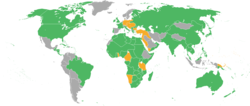
The Allies of the First World War were the countries that opposed the Central Powers. The members of the original Triple Entente of 1907 were the French Republic, the British Empire and the Russian Empire. Italy ended its alliance with the Central Powers, arguing that Germany and Austria-Hungary started the war and that the alliance was only defensive in nature; it entered the war on the side of the Entente in 1915. Japan was another important member. Belgium, Serbia, Greece, Montenegro, and Romania were affiliated members of the Entente.
The 1920 Treaty of Sèvres defines the Principal Allied Powers as the British Empire, French Republic, Italy and Japan. The Allied Powers comprised, together with the Principal Allied Powers, Armenia, Belgium, Greece, Hejaz, Poland, Portugal, Romania, Serb-Croat-Slovene state and Czechoslovakia.
The U.S. declaration of war on Germany, on 6 April 1917 was on the grounds that Germany had violated its neutrality by attacking international shipping and the Zimmermann Telegram sent to Mexico. It declared war on Austria-Hungary in December 1917, entering as an "associated power", rather than as a formal ally of France and the United Kingdom, in order to avoid "foreign entanglements". Although the Ottoman Empire and Bulgaria severed relations with the United States, neither declared war.
The Dominions and Crown Colonies of the British Empire made great contributions to the Allied war effort, but did not have independent foreign policies with the British War Cabinet exercising operational control of British Empire forces. The Dominion governments did control recruiting, and removed personnel from front-line duties as they saw fit. From early 1917, the War Cabinet was superseded by the Imperial War Cabinet, which had Dominion representation. The Australian Corps and Canadian Corps were placed under the command of Australian and Canadian Lieutenant Generals John Monash and Arthur Currie, respectively, who reported in turn to British generals. In April 1918, operational control of all Entente forces on the Western Front passed to the new supreme commander, Ferdinand Foch of France.[1]
References / notes
- ↑ Allies of World War I. Wikipedia: The free encyclopedia. Accessed 18 April, 2017.
Glossary of words and phrases
The above term is listed in our glossary of words and phrases of the Armed Forces of Great Britain during the Great War. Included are trench slang, service terms, expressions in everyday use, nicknames, the titles and origins of British and Commonwealth Regiments, and warfare in general. These words and phrases are contemporary to the war, which is reflected in the language used. They have been transcribed from three primary sources (see Contents). Feel free to expand upon and improve this content.
Browse other terms: A B C D E F G H I J K L M N O P Q R S T U V W X Y Z